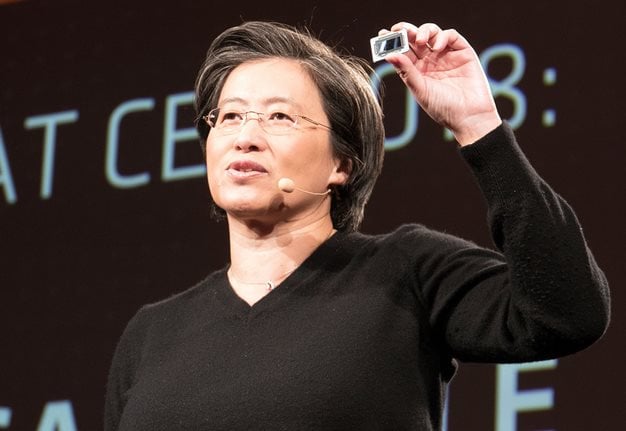AMD Commits All 7nm GPU And Zen 2 CPU Fabrication To TSMC Along With An Exec Shuffle

On the personnel side, Jim Anderson, who served as AMD's General Manager and Senior Vice President of Global Computing and Graphics Sales, is leaving the company effective September 4th. Anderson decided to leave his post to take a position as President and CEO of Lattice Semiconductor. This is quite the move up the corporate latter for Anderson, who will also serve on the company's board of directors.
"Jim brings a strong combination of business and technical leadership with a deep understanding of our target end markets and customers. The transformation he drove of AMD’s Computing and Graphics business over the past few years is just a recent example of his long track record of creating significant shareholder value," wrote Jeff Richardson, Lattice's Chairman of the Board.

"We are excited to bring Jim’s proven leadership to Lattice as we accelerate all aspects of the company in order to capture the enormous opportunity that lies ahead.”
AMD has promoted Saeid Moshkelani to Anderson's position and he will report directly to CEO Dr. Lisa Su. Moshkelani has been with the company since 2012. In addition, Darren Grasby, who serves as SVP of Global Computing and Graphics and President of EMEA operations, will also now report directly to Su.
"Saeid and Darren are the right leaders to combine our product leadership with strong and strategic customer relationships as we enter our next phase of growth in the client PC market," said Su. "I am grateful to Jim for his many contributions to AMD and wish him the very best as he begins a new chapter in his career."

On the hardware front, AMD announced that it all of its 7nm production -- for both GPUs and CPUs – will be handled by TSMC. This will include next-generation 7nm Vega and Navi GPUs along with AMD's 7nm EPYC CPUs for the server market. In a blog post, AMD's Mark Papermaster clearly laid out the company's intentions for 7nm moving forward:
We have invested heavily in our architecture and product roadmaps, while also making the strategic decision to bet big on the 7nm process node. AMD’s next major milestone is the introduction of our upcoming 7nm product portfolio, including the initial products with our second generation “Zen 2” CPU core and our new “Navi” GPU architecture. We have already taped out multiple 7nm products at TSMC, including our first 7nm GPU planned to launch later this year and our first 7nm server CPU that we plan to launch in 2019. Our work with TSMC on their 7nm node has gone very well and we have seen excellent results from early silicon.
AMD's decision to rely on TSMC for its premier 7nm products means that GlobalFoundries is putting its own 7nm FinFET production on hold indefinitely. GlobalFoundries CEO Tom Caulfield explains:
The vast majority of today’s fabless customers are looking to get more value out of each technology generation to leverage the substantial investments required to design into each technology node. Essentially, these nodes are transitioning to design platforms serving multiple waves of applications, giving each node greater longevity. This industry dynamic has resulted in fewer fabless clients designing into the outer limits of Moore’s Law. We are shifting our resources and focus by doubling down on our investments in differentiated technologies across our entire portfolio that are most relevant to our clients in growing market segments.
With this in mind, AMD says that it will continue to use GlobalFoundries for its 12nm and 14nm production lines "spanning multiple process notes and technologies".
According to previous guidance from AMD, its first 7nm Radeon Instinct GPU accelerators were in the testing lab back in April and are on track to sample to customers later this year. As for CPUs, "7nm Zen 2 based product we'll sample later this year to customers and that will be in production in 2019, and we do believe that the adoption rate of the second-generation could potentially be higher than the adoption rate of the first-generation, mostly because customers will be more familiar with our systems and our products," said Su in late April.
AMD is hoping that a smooth transition to 7nm CPUs will help it to gain a leg-up on Intel, which has struggled to get its 10nm process technology out the door. Intel has confirmed that its first consumer systems with 10nm process technology won't ship until late 2019, which is over a year from now. Intel says that its first 10nm Ice Lake-SP Xeon Scalable processors won't be shipping until somewhere in the 2020 timeframe.

